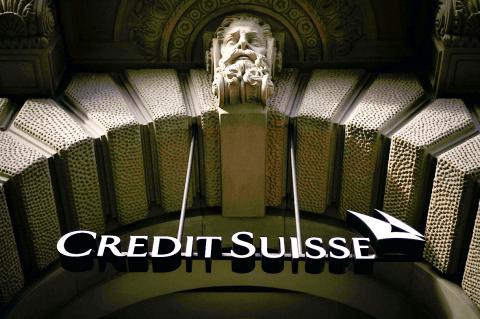Swiss bank Credit Suisse agreed on Friday to pay US$885 million to settle US charges it sold shoddy mortgage bonds to Fannie Mae and Freddie Mac ahead of the financial crisis.
Credit Suisse will pay about US$651 million to Fannie and US$234 million to Freddie, said the US Federal Housing Finance Agency (FHFA), the conservator of the two companies rescued by government during the 2008 financial crisis.
The FHFA said the settlement resolves all of its claims in two lawsuits against Credit Suisse.

Photo: AFP
The claims alleged that Credit Suisse misrepresented the quality of billions of dollars of mortgage-backed securities it sold to Freddie and Fannie during 2005 to 2007.
Credit Suisse agreed to the settlement while still “vigorously” denying the allegations in both cases.
The agency said the bank’s documentation for the securities contained misstatements and omissions of material facts concerning the quality of the underlying mortgage loans, the creditworthiness of the borrowers and the practices used to originate such loans.
During the years-long housing bubble, banks’ loose lending practices extended subprime mortgages to borrowers with patchy credit and at-risk finances. Those borrowers began to default on the loans, spurring the subprime crisis that collapsed the bubble and led to the 2008 financial crisis.
“As a result of defendants’ misstatements and omissions of material fact, Fannie Mae and Freddie Mac have suffered substantial losses as the value of their holdings has significantly deteriorated,” the suit said.
The FHFA was created in 2008 to oversee the government’s conservatorship of Fannie and Freddie, which back most of the mortgages financed in the US.
The settlement marks the latest big government settlement with a US banking giant in the aftermath of the housing bust.
Since the beginning of the year, the FHFA has announced US$2.26 billion in settlements, including the latest with Credit Suisse.
Wall Street bank Morgan Stanley paid US$1.25 billion and French bank Societe Generale paid US$122 million last month.
For all of last year, the FHFA recovered nearly US$8 billion on behalf of taxpayers through such settlements.
FHFA sued 18 financial institutions in 2011 alleging securities law violations, and in some cases, fraud, in relation to their marketing of mortgage-backed securities.
Credit Suisse on Friday said it would take an after-tax charge of 275 million Swiss francs (US$311.6 million) on its financial results last year.
“This agreement resolves Credit Suisse’s largest mortgage-related investor litigation,” the Zurich-based bank said in a statement.
Credit Suisse is also one of 14 Swiss banks under US investigation for allegedly accepting tens of billions of undeclared dollars from US citizens trying to avoid taxes.
A former banker of Credit Suisse pleaded guilty on March 12 to the charge.
Andreas Bachmann, a Swiss citizen, admitted that between 1994 and 2006, he engaged in a “wide-ranging” conspiracy to defraud US tax officials, the US Department of Justice said.

TAKING STOCK: A Taiwanese cookware firm in Vietnam urged customers to assess inventory or place orders early so shipments can reach the US while tariffs are paused Taiwanese businesses in Vietnam are exploring alternatives after the White House imposed a 46 percent import duty on Vietnamese goods, following US President Donald Trump’s announcement of “reciprocal” tariffs on the US’ trading partners. Lo Shih-liang (羅世良), chairman of Brico Industry Co (裕茂工業), a Taiwanese company that manufactures cast iron cookware and stove components in Vietnam, said that more than 40 percent of his business was tied to the US market, describing the constant US policy shifts as an emotional roller coaster. “I work during the day and stay up all night watching the news. I’ve been following US news until 3am

UNCERTAINTY: Innolux activated a stringent supply chain management mechanism, as it did during the COVID-19 pandemic, to ensure optimal inventory levels for customers Flat-panel display makers AUO Corp (友達) and Innolux Corp (群創) yesterday said that about 12 to 20 percent of their display business is at risk of potential US tariffs and that they would relocate production or shipment destinations to mitigate the levies’ effects. US tariffs would have a direct impact of US$200 million on AUO’s revenue, company chairman Paul Peng (彭雙浪) told reporters on the sidelines of the Touch Taiwan trade show in Taipei yesterday. That would make up about 12 percent of the company’s overall revenue. To cope with the tariff uncertainty, AUO plans to allocate its production to manufacturing facilities in

Six years ago, LVMH’s billionaire CEO Bernard Arnault and US President Donald Trump cut the blue ribbon on a factory in rural Texas that would make designer handbags for Louis Vuitton, one of the world’s best-known luxury brands. However, since the high-profile opening, the factory has faced a host of problems limiting production, 11 former Louis Vuitton employees said. The site has consistently ranked among the worst-performing for Louis Vuitton globally, “significantly” underperforming other facilities, said three former Louis Vuitton workers and a senior industry source, who cited internal rankings shared with staff. The plant’s problems — which have not

TARIFF CONCERNS: The chipmaker cited global uncertainty from US tariffs and a weakening economic outlook, but said its Singapore expansion remains on track Vanguard International Semiconductor Corp (世界先進), a foundry service provider specializing in producing power management and display driver chips, yesterday withdrew its full-year revenue projection of moderate growth for this year, as escalating US tariff tensions raised uncertainty and concern about a potential economic recession. The Hsinchu-based chipmaker in February said revenues this year would grow mildly from last year based on improving supply chain inventory levels and market demand. At the time, it also anticipated gradual quarter revenue growth. However, the US’ sweeping tariff policy has upended the industry’s supply chains and weakened economic prospects for the world economy, it said. “Now